#best best screenplay tournament
Explore tagged Tumblr posts
Text
Top two vote-getters will move on to the next round. See pinned post for all groups!
#best best screenplay tournament#oscars#academy awards#best original screenplay#fargo#coen brothers#joel coen#ethan coen#moonstruck#john patrick shanley#little miss sunshine#michael arndt#the lavendar hill mob#t. e. b. clarke#the piano#jane campion#brackets#bracket tournament#poll#polls
35 notes
·
View notes
Text
Have You Seen This Lost GUMI Anime Pilot?
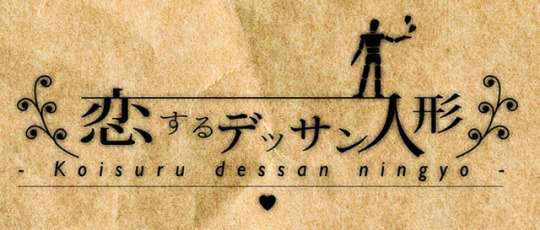
This is a bit of an unusual post for this blog, but I think I may have come across a case of lost media involving an anime pilot starring GUMI. It's possible that it exists on the Internet, and I hesitate to declare this as "lost media," but I cannot find it anywhere, and I figured that a post on this blog was the best way to see if anyone has any leads or extra info.
The anime is titled "Koisuru Dessan Ningyo," with an English title of "Do Drawing Dolls Dream of Love?" I don't know the runtime of the pilot, but I think it was most likely around 5-7 minutes. I believe this could have been the first instance of a Vocaloid being cast in a main voice acting role (perhaps, the first one cast in any voice acting role). I'm not completely sure if they actually used the Megpoid voicebank, or had Megumi Nakajima voice act as GUMI, but the way AnimeAnime (Japanese anime news site) describes it, it seems like it may have been the former. In either case, the character that GUMI portrays in the anime is a character that is clearly made to resemble her.
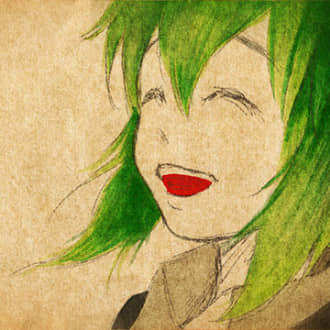
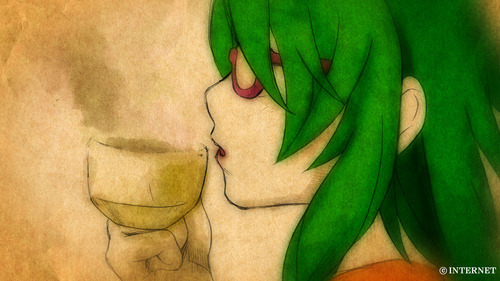

(These are the only screenshots I could find that come from the pilot, but more may exist.)
The main character is a doll (who I'm not sure is named), who models for a girl's drawings before eventually falling in love with her. I don't believe GUMI's character has a name, but she plays a main role as the girl the doll falls in love with.
Where It Was Seen
The pilot aired on NHK TV on January 9, 2014, during late night (possibly just after midnight?). It aired alongside another pilot as part of the program Aoyama 1seg Kaihatsu. This was a sort of tournament, where two pilots were broadcast once a month for three months, and viewers would vote for which pilot they liked best. Then, the three winners would go against each other in a final round, where the pilot with the most votes would get picked up to become a series. (I think they held this tournament once a year from 2010 to 2014 or 2015, though I don't know if it was the exact same every time.) The broadcast was 25 minutes long for each of the first three rounds, with the first half dedicated to showing both pilots and the second half dedicated to presentations about each pilot. (This is why I think this pilot was around 5-7 minutes, though I'm not sure exactly how much time commercial breaks would take up.) For a few years, including 2014, the program was hosted by the now-disbanded Japanese girl group E-girls (no relation to what you and I know as "e-girls." in their case the E stands for "exile.")
According to the official Tumblr account, karappo-heart, this pilot won the first round of the competition! It probably didn't make it out of the finals, though, since it didn't get picked up for a series. It's also possible that it did win, but some other issues prevented its production. In any case, the Tumblr account hasn't been updated since the first round ended. While this contest was going on, three shorts were apparently available to watch on NHK's website, but they have since been removed. I think at least one of the shorts was web-exclusive. I haven't been able to find info on who actually won the finals, or even what GUMI's short won against.
People Involved
The doll is portrayed by a masked dancer refererred to as Hitori de Dekiru Mon. I can't find much info about him online, but I think his real name is Takemura Ryohei. (I'm not sure because that part on his Japanese Wikipedia article has a "citation needed" label.) AnimeAnime specifically refers to his role as being the doll's "human form," though it's possible he provided voice acting too. AnimeAnime points out the unusual nature of having a human portray a doll, and having a Vocaloid portray a human.
Masanori Okamoto (who also wrote the screenplay and produced the pilot) animated the pilot with the pixilation technique, using time-lapse pictures to show movement of objects and people (this may have included live-action photos of the doll's actor portraying a "human form" of the doll). It seems like it may have blended stop motion/puppetry and live action stills with traditional animation? This is an example of Okamoto's work from around the same time, which seems like it might have been made in a similar style:
youtube
The third known person to have worked on this is none other than Vocaloid producer sasakure.UK. He composed the theme song, which of course features GUMI, and a few other songs to be used in potential future episodes. If you're a big fan of his, the anime title may sound familiar to you, as he released 3 of these songs (though both news sites I looked at, AnimeAnime and Anime News Network, say he made 4 total) plus their instrumentals as an EP under the same title. You can listen to the whole thing on YouTube!
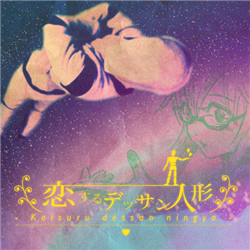
I think this EP uses GUMI's VOCALOID3 voicebanks (the first sounds like either Native or Sweet, the second one sounds like Adult or Power (if it even is GUMI--it sounds more like IA to me, but sasakure.UK labeled it as a GUMI song so I kinda have to take his word for it) and the third sounds like Sweet). If that's the case, her V3 voicebanks would have probably been used for the voice acting, too.
Places I've Looked
After some Internet searches only garnered me a few screenshots, I decided to see if there was a way I could ask sasakure.UK himself about the short. I believe he has a contact form on his website, which I used to send a message in both Japanese and English (in case Google Translate was more helpful to him than my incoherent Japanese). This was back in May of this year and I never received a response. (Since I used a website contact form and not a direct email, I don't have the message I sent him anymore. I guess that's lost media now too.)
It occured to me while writing this post that I never contacted the animator himself, Masanori Okamoto. While his Vimeo and YouTube pages don't have the pilot, and his Twitter and Tumblr links haven't been updated in several years, he does have an email address listed. I sent him a message (in English because I was too sick and tired to try to write a coherent email in Japanese and I don't like waiting to do these things). I'm not sure he still checks his email since his social media that I've found has all been inactive for years, but I will post an update if he responds.
I know that this pilot is not on the NHK website, or, again, on the animator's YouTube or Vimeo pages. I also could not find it on the Internet Archive.
Now, I don't expect anyone reading this to have saved this on their computer and kept it there since 2014. But with this post, my goal is simply to make more people aware that this exists at all, and I'd also like to learn more about it myself (such as whether or not the pilot won in the finals after all, how much animation actually exists for it, if any more screenshots are out there, etc.)
Thank you for reading such a long post! Please feel free to correct any info I got wrong, or add on to this post with any knowledge you might have about this lost pilot!
(also sorry for any typos :()
#vocaloid#lost media#sasakure.uk#gumi#japanese vocaloid#vocaloid2#vocaloid3#internet co#lost content
191 notes
·
View notes
Text
Review: Challengers

Dir. Luca Guadagnino
What if you have a love triangle in which each of the three points represents someone who’s pretty awful? Put it another way: How are you meant to root for anyone in a movie if they all seem equally — if in their own ways — regrettable?
The answer, as explored in Luca Guadagnino’s tennis-based love drama, seems to question the very idea of rooting for someone at all in such a situation. This is a confounding idea for a movie that is ostensibly about sports, and make no mistake, there are a great number of long scenes of the characters playing tennis, with a great variety of POV shots (some from the players; some, more jarringly, from the ball itself), and much discussion of said sport, and the strategies therein.
Still, for all its concern with tennis — and the structure of the film follows along a championship match at a lesser ATP tournament between our two sparring lotharios — Guadagnino, working from a screenplay by Justin Kuritzkes, isn’t so much concerned with the sporting outcome of a given match, but the emotional stakes it represents.
It makes for an intriguing, if at times ham-handed, approach to the standard sports genre model of the game being the thing. Here, the game is just the backdrop for the emotional stakes it becomes imbued with over time.
The film’s skeletal structure follows a championship game at a lesser ATP event in New Rochelle, NY, between two men. When we first lay eyes on Patrick (Josh O’Connor), he seems like the scrappy underdog to the far more fluid and accomplished Art (Mike Faist). As they play, both men seem preoccupied with one of the spectators, the stunning Tashi (Zendaya), sitting dead in the middle (symbolism alert!), watching both players with rapt attention.
As the game progresses, we get a series of flashbacks, some from a couple of weeks back — Art, a perennial grand champion and megastar, having to come back from injury and general ennui, gets talked into playing this event by his coach/wife Tashi — some from as far as 13 years ago — Art and Patrick, long best friends at the all-encompassing tennis academy they both attend, meet Tashi at a party in her honor, as one of the best young players in the world, and both fall madly in love with her.
Eventually, through these series of flashbacks we get the gist of the stakes at this particular championship match: Tahsi started out dating flashy Patrick, who turned pro rather than attend Stanford, along with the other two; but their falling out, especially after Tashi suffers a career-ending knee injury, left her available for the more reserved, dependable Art, whom she eventually marries.
The couple then cut Patrick entirely out of their lives. As Art ascends to the peak of tennis royalty, Patrick descends into playing for peanuts on qualifying tour gigs, hooking up with women in different cities more or less as a way of not having to sleep in his car.
However, Patrick’s more brazen allure (as a successful doubles pairing, the boys were known as “Fire and Ice,” and while it’s never clearly specified who was who, it become increasingly clear as the film progresses) never quite stops for Tashi, who vacillates between cheating on Art with Patrick, and wanting absolutely nothing to do with him.
If that weren’t betrayal enough, she also meets with Patrick, a player her husband has never beaten on the court, the night before the championship match, to convince him to throw the match so that Art can win and build up his confidence heading into majors season. The price, as you might expect, is once again sleeping with him, a cruel outcome for the unsuspecting Art.
To the film’s credit, the characters are far more slippery than the standard sports tropes might expect: Patrick, for all his seeming down-on-his-luck underdog position, actually comes from an exceedingly wealthy family. As Tashi points out to him forcefully towards the film’s end, after Patrick has asked her to drop Art as a client and become his coach, all of his poor penniless affect is actually just an act. Tashi, for her part, comes across as supremely confident and assertive, but clearly has a lot of not fully explored contradiction to her. She might bark orders at her dutiful husband, but it’s also clear her sense of boundaries are blurred to the point of being unrecognizable.
Art, meanwhile, as docile and reserved as he seems (in befitting a tour champion of his caliber at a less glamorous event such as this, doesn’t actually say a word for the first 15 or so minutes of the movie), has already decided he’s done playing professionally after this current year, and tells Tashi so — a move Patrick has already predicted to her.
What Guadagnino is also after, more in keeping with the director of the exçellent Call Me By Your Name, is the not-so secret love affair between the pair of boys. In an early scene, after first meeting Tashi and convincing her, somehow, to come to their hotel room for an after-hours celebration, she begins kissing both of them before discreetly pulling back and allowing them to passionately kiss one another for several long seconds before they realize she’s no longer between them. Less subtly still, Guadagnino references phallic imagery between the boys — think bananas, and churros, they gleefully tear into in front of one another — as a way of advancing the idea of their unverbalized love.
Their battle of one upmanship becomes more about unrealized adoration of one another, a fact Tashi (who already sees a tennis match as a “relationship” between the combatants) seems all too keenly aware of, throughout their lives interwoven together. It is an interesting way to display the character’s wants and desires — almost everyone wants something they don’t actually get: Tashi wants a dominating pro career; Patrick wants to be reconciled with his friends; Art wants Tashi’s love and devotion — and to stack all of these unfettered desires on the scope of a minor ATP event yields some interesting bits.
Still, it’s a tricky thing to have an audience invest in characters who are ostensibly either so selfishly minded, or egregiously unaware of their own desires, that they too often act like pariahs. In harmony with the film’s title, we as an audience are tasked with caring about these often loathsome characters without much of an emotional anchor. For all the film’s playfulness with time and structure, it really boils down to a threesome of people who probably would have been better off had they not met at all.
#piers marchant#sweet smell of success#ssos#movies#films#challengers#luca guadagnino#zendaya#tennis#josh o'connor#mike faist
20 notes
·
View notes
Photo

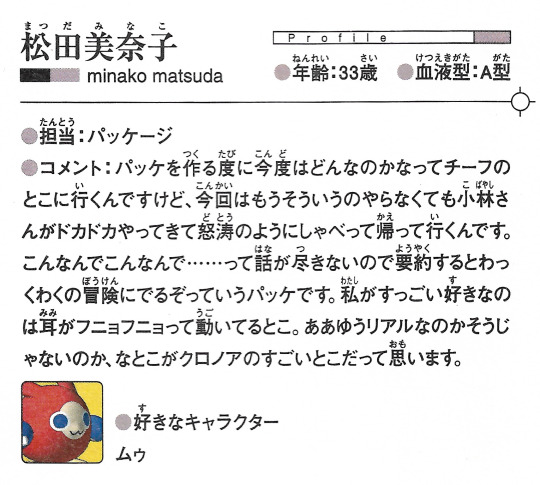
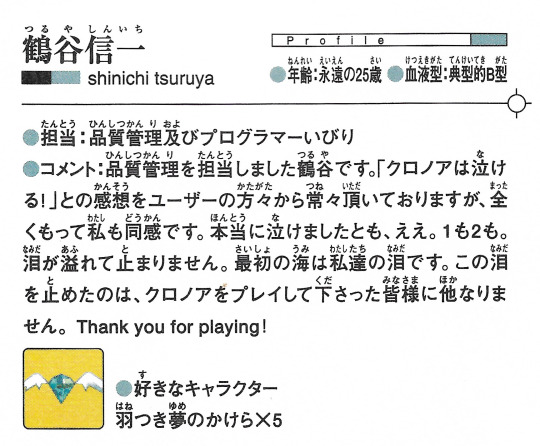

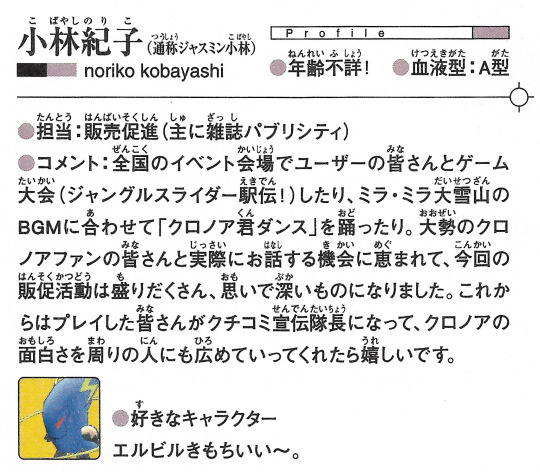
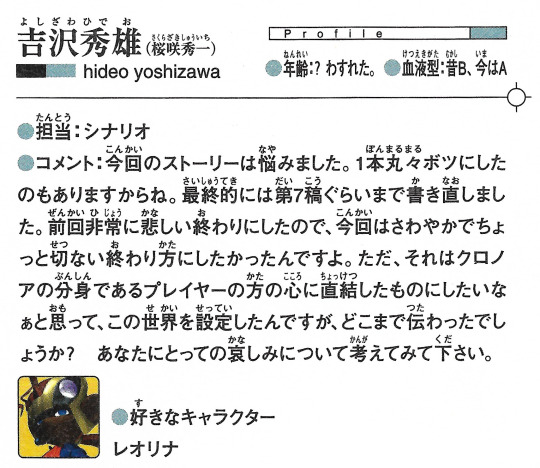
From: Klonoa 2: Lunatea’s Veil Official Guide Book (Published by Famitsu/Enterbrain - 2001) (Pg. 207)
~Messages from the Klonoa 2 Staff~ Lastly, we would like to show you messages from those who were involved in the development of Klonoa 2 to the public. You'll find hard work, inside stories, and a few positive ones(?!) here and there! ......So, thank you all for your hard work!
Tomomitsu Kaneko Profile: ● Age: 24 years old ● Blood Type: O ● Responsibilities: Sound Effects ● Comments: Sound effects...... sound effects? Ugh, too much light. ● Favorite character: Likuri
Minako Matsuda Profile: ● Age: 33 years old ● Blood Type: A ● Responsibilities: Package Design ● Comments: Every time we make a package, we go to the chief to see what the next one will be like, but this time, we don’t have to do that anymore, Mr. Kobayashi just comes in and talks like a madman and leaves. I could go on and on about this and that, so to sum it up, this is a package that says, “Let’s go on an exciting adventure!” What I really like is the part where the ears are moving. I think that’s what makes Klonoa so great. ● Favorite character: Moo
Shinichi Tsuruya Profile: ● Age: 25 forever ● Blood Type: Typical B ● Responsibilities: Quality control and programmer snoozing ● Comments: I am Tsuruya, in charge of quality control. I have always heard users say, “Klonoa makes me cry!” I agree with you completely. It really made me cry, yes. Both 1 and 2. I can’t stop crying. The first ocean is our incapacitation. It was only those who played Klonoa that stopped the tears. Thank you for playing! ● Favorite character: Large Dream Stone with wings x5
Ryo Sakamoto Profile: ● Age: 28 years old ● Blood Type: O ● Responsibilities: Quality control (Debugging) ● Comments: Hello, my name is Sakamoto of Quality Control. I hope you all are enjoying the scaled-up Klonoa 2 in all aspects. My favorite song is from Mts. of Mira-Mira. When I was tired, that BGM cheered me up. You may also feel more energetic if you listen to it when you are tired. Last but not least, the entire staff will continue to do our best based on your support, so please continue to support Klonoa for a long time to come. See you soon! ● Favorite character: Moo (I like the way he walks)
Noriko Kobayashi Profile: ● Age: Unknown! ● Blood Type: A ● Responsibilities: Sales Promotion (Public Relations - mainly magazine publicity) ● Comments: We held game tournaments (Jungle Slider Relay Race!) with users at event sites across the country. We also danced the “Klonoa-kun Dance” to the background music of the Mts. of Mira-Mira stage. We were blessed with the opportunity to actually talk with many Klonoa fans, making this year’s sales promotion activity a very memorable one. I hope that everyone who played the game will become a word-of-mouth promotion captain and spread the fun of Klonoa to the people around them. ● Favorite character: Erbil is so nice~
Hideo Yoshizawa Profile: ● Age: Age? I forgot. ● Blood Type: Once a B, now an A ● Responsibilities: Scenario (Screenplay, Supervisor) ● Comments: I had a lot of trouble with this story. I even had to reject one entire story. In the end, I rewrote the story up to about the seventh draft. I wanted to make a fresh and a little sad ending this time, since I made a very sad ending last time. But I wanted it to be directly connected to the hearts of the players, who are the alter egos of Klonoa, and that’s how I set up this world. Think about what sorrow means to you. ● Favorite character: Leorina
37 notes
·
View notes
Text

Gene Hackman in The Quick and the Dead (Sam Raimi, 1995)
Cast: Sharon Stone, Gene Hackman, Russell Crowe, Leonardo DiCaprio, Tobin Bell, Roberts Blossom, Kevin Conway, Keith David, Lance Henriksen, Pat Hingle, Gary Sinise. Screenplay: Simon Moore. Cinematography: Dante Spinotti. Production design: Patrizia von Brandenstein. Film editing: Pietro Scalia. Music: Alan Silvestri.
I miss Gene Hackman. When he retired in 2004, it had seemed for a while that he was in every other movie being made: In 2001, for example, he made five, including one of his best comic performances in Wes Anderson's The Royal Tenenbaums. In the year he made The Quick and the Dead he was also in Tony Scott's Crimson Tide and Barry Sonnenfeld's Get Shorty. He's certainly the best thing about Sam Raimi's mock-spaghetti Western, in a role that echoes his Oscar-winning one in Unforgiven (Clint Eastwood, 1992). He brings the same infuriating self-satisfied smirk to his performance as John Herod, the ruthless boss of the town of Redemption as he did in the role of the ruthless sheriff "Little" Bill Daggett in Eastwood's movie. Hackman's great gift was the ability to give memorably watchable performances without overwhelming a film's ensemble, and the ensemble for The Quick and the Dead is a good one, even if they're playing slightly skewed versions of Western stereotypes. Sharon Stone, who was one of the producers of the movie, plays the stranger who rides into town; Russell Crowe is the outlaw who wants to give up killing; and Leonardo DiCaprio is the gun-happy kid. The setup is that Herod is staging a tournament, pairing off gunslingers in one-on-one shootouts until only one is left standing. You can guess immediately who the final four will be. It's by no means a landmark film, but Raimi's direction gives it the right pace, and the actors, including good character turns by Pat Hingle, Lance Henriksen, and Keith David, make it watchable, as does Dante Spinotti's cinematography.
4 notes
·
View notes
Text

Go Illini.
Here are this week's stories:
SATURDAY Cate Blanchett Movies, Ranked (Vulture)
SUNDAY College Basketball Is Good Again, and It's Because of NIL and the Transfer Portal (The Washington Post)
TUESDAY Things to Know Before You Fill Out Your Bracket (New York) The Dodgers Are Already the Dodgers (MLB.com)
WEDNESDAY Illini Power Rankings: NCAA Tournament Edition (Illini Board)
PODCASTS
Grierson & Leitch (subscribe in iTunes) No show this week.
Morning Lineup (subscribe in iTunes) I did Tuesday's and Thursday's show.
Seeing Red (subscribe in iTunes) Bernie and I did a Happy Show, a look at the Cardinals from every best-case scenario.
The tournament really is the best. Have a great weekend, all, and remember: This movie is a real mess, an incomprehensible, ugly, unstructured, pointless excursion into the murkier realms of one of the most confusing screenplays of all time. Even the color is no good; everything is seen through a sort of dusty yellow filter, as if the film was left out in the sun too long.
1 note
·
View note
Text
The Karate Kid Part III (1989)
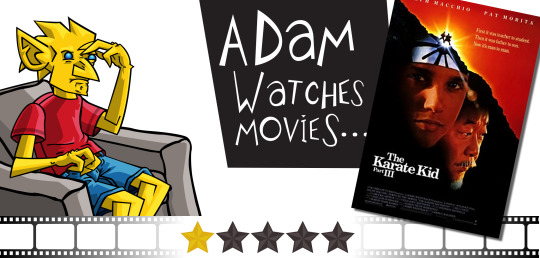
While I didn't enjoy this film, that doesn't mean you won't. No matter what I say, the people involved in this project did it: they actually made a movie. That's something to be applauded. With that established...
The strength of the Karate Kid series lies in its emotional power. You could probably predict how the first one might end but you were so invested in the relationship between Daniel and Mr. Miyagi (Ralph Macchio and Noriyuki “Pat” Morita) that you forgot about all the times you’d seen the story before. Everything that rang true, that was effective in the first film (and the sequel to a certain extent) is present in this third chapter… but none of it works. Cartoonish villains, characters who’ve regressed and a repetitive plot make The Karate Kid Part III feel like a cash grab and nothing else.
Having lost his students and dojo, John Kreese (Martin Kove) visits his best friend, Terry Silver Thomas (Ian Griffith) to tell him he’s giving up on Cobra Kai. Instead, of moving on, however, he and Terry decide to partake in an elaborate revenge scheme. Posing as a new friend and teacher for Daniel, Terry will infiltrate his life so he can tear the boy and his beloved teacher apart.
I’m not sure if Ian Griffith is the best or the worst thing about this movie. One of his first scenes has him chomping on a gargantuan cigar in a hot tub, giving notes to his secretary about how he’s going to hide all of these mega-pollutants from the authorities. Combined with his ponytail, eagerness to jump on the revenge bandwagon and easily-revealed colours, you expect him to be facing off against Captain Planet, not some teenager and an old man trying to make a living selling bonsai trees. He’s ten times as maniacal as any of the bad guys we’ve seen in this series and less subtle than Emperor Palpatine.
On his own, Terry might’ve made the film unintentionally hilarious if it weren’t for Daniel. You’d think that by now the boy would understand a thing or two about Miyagi, that he’d respect him. No. At every instance, Daniel questions Miyagi’s tried-and-true methods, goes against his wishes or tries to do something sneaky behind his back. What’s infuriating is that you know exactly how it will play out. The movie holds no surprises whatsoever. In fact, it choreographs itself in ways that would be clever if they weren’t so transparent. For example, the film begins - once again - by informing us that the relationship we spent the previous movie developing has dissolved. Kumiko is briefly mentioned but never appears. She’s been replaced by Jessica Andrews (Robyn Lively) who quickly informs Daniel that she’ll be moving away in two months. At least the screenplay has learned SOMETHING from these movies. It establishes a way for her not to appear in any subsequent sequels!
Writer Robert Mark Kamen (who didn’t like this premise but whose alternative was even worse) does the bare minimum and director John G. Avildsen does not attempt to turn this pile of straw into gold. The villain’s plan involves sending his cronies to commit vandalism, theft, and attempted murder but the police are briefly mentioned once and then never again. This plot isn’t concerned with what would actually happen. It’s just going through the motions so we can get to the tournament at the end of the movie and watch Daniel beat the odds AGAIN. The Karate Kid Part III isn’t merely a disappointment, it’s a waste of time. (March 10, 2022)
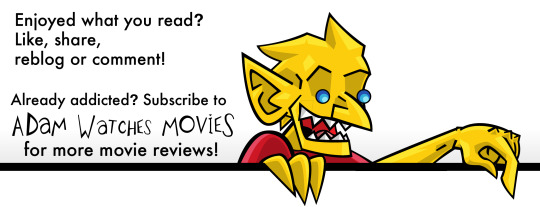
#The Karate Kid Part III#The Karate Kid#movies#films#movie reviews#film reviews#john g. avildsen#RObert Mark Kamen#Ralph Macchio#Noriyuki “Pat” Morita#Pat Morita#1989 movies#1989 films
1 note
·
View note
Text
Top 5 @Wikipedia pages from a year ago: Monday, 19th December 2022
Welcome, მოგესალმებით (mogesalmebit), 환영 (hwanyeong), mirë se vjen 🤗 What were the top pages visited on @Wikipedia (19th December 2022) 🏆🌟🔥?

1️⃣: Lionel Messi "Lionel Andrés Messi (Spanish pronunciation: [ljoˈnel anˈdɾes ˈmesi] ; born 24 June 1987), also known as Leo Messi, is an Argentine professional footballer who plays as a forward for and captains both Major League Soccer club Inter Miami and the Argentina national team. Widely regarded as one of the..."

Image licensed under CC BY 4.0? by Hossein Zohrevand
2️⃣: Kylian Mbappé "Kylian Mbappé Lottin (born 20 December 1998) is a French professional footballer who plays as a forward for Ligue 1 club Paris Saint-Germain and captains the France national team. Regarded as one of the best players in the world, he is renowned for his dribbling abilities, exceptional speed, and..."
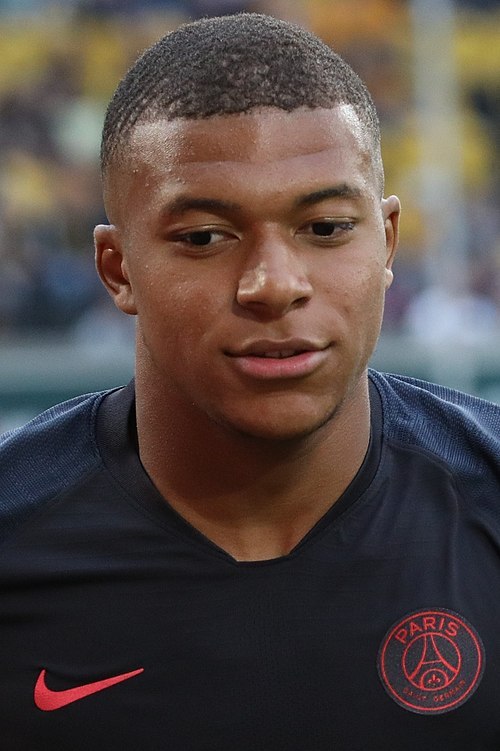
Image licensed under CC BY-SA 4.0? by Sandro Halank, Wikimedia Commons
3️⃣: FIFA World Cup "The FIFA World Cup, often simply called the World Cup, is an international association football competition between the senior men's national teams of the members of the Fédération Internationale de Football Association (FIFA), the sport's global governing body. The tournament has been held every..."

Image licensed under CC BY 4.0? by Hossein Zohrevand
4️⃣: 2022 FIFA World Cup "The 2022 FIFA World Cup was the 22nd FIFA World Cup, the world championship for national football teams organized by FIFA. It took place in Qatar from 20 November to 18 December 2022, after the country was awarded the hosting rights in 2010. It was the first World Cup to be held in the Arab world..."
5️⃣: Avatar: The Way of Water "Avatar: The Way of Water is a 2022 American epic science fiction film co-produced and directed by James Cameron, who co-wrote the screenplay with Rick Jaffa and Amanda Silver from a story the trio wrote with Josh Friedman and Shane Salerno. Distributed by 20th Century Studios, it is the sequel to..."
0 notes
Text
The Fact-Checker Who Just Couldn't Fiction: One Man's Struggle Between Truth and Lies

Jackson "Jack" Worthy was thrilled to land a job as a fact-checker for a major news organization. "Finally, a job where my obsessive attention to detail is an asset!" he thought to himself. However, his excitement quickly turned to panic when he learned he had to pass a true-or-false screening test first. Despite studying rigorously, Jack failed the test not once, not twice, but three times before barely scraping by on the fourth try. "I guess constantly questioning and second-guessing facts doesn't lend itself well to multiple choice exams," Jack realized a little too late. (Editor's Note: Five times, record can prove he passed on the 5th attempt! Jack should've taken the hint after the first failure. He claims it was a computer error.). Still, Jack managed to hang onto his new job by the skin of his teeth. At first, he felt right at home, eagerly verifying statistics, poring over sources, and pestering writers and editors about any potential inaccuracies. But over time, Jack started getting a little loose with the facts. He'd approve an article saying the mayor was 47 when she was really 48. He let a claim that it rained 3 inches yesterday stand, even though the weather station recorded 2.5. When asked if he was fired from a previous job, Jack replied "False! I voluntarily relocated to new opportunities." (Editor's Note: AKA he was totally fired). His casual relationship with the truth didn't sit well with his employers. When Jack claimed he still lived in his hometown of Scranton, PA, despite moving to Albany, NY years ago, the head fact-checker called him out, after double, triple and quadruple checking facts before confirming them as true.
"But Scranton just feels more emotionally true to me," Jack tried arguing. "Plus it rhymes with canton." But his excuses didn't fly. Now unemployed, Jack wonders if a lifelong dedication to nitpicking facts was really meant to be. "Oh well," he sighs. "I heard there's an opening for a creative fiction writer I'd be perfect for…"
After departing from the news organization, Jack decided to try his hand at writing fiction. No longer constrained by pesky "facts", he was free to let his imagination run wild. Or so he thought. He wrote a novel about an elite league of martial arts fighters who competed in an underground tournament called "Kumite". Reviewers praised its gritty action sequences, even if some of the MMA moves described didn't actually exist. . When Jack drafted a screenplay about a college a cappella group called the "Barden Bellas", his agent questioned whether competitive a cappella was really a thing. "Well it just became a thing because I say so," Jack replied confidently. (Editor's Note: Sounds fake but okay). But when Jack pitched a biography of the first dog to be elected US President, no publisher would bite. "You can't pass that off as non-fiction!" the editors scolded him. (Editor's Note: What were you thinking, Jack??) Frustrated, Jack realized even fiction writing required some grounding in reality. So he set his sights on a new career: political speechwriter. Here his fast-and-loose relationship with the truth would be an asset, not a liability! Or so he assumed. Jack landed a job on a presidential campaign. At first, he felt right at home putting positive "spins" on ambiguous facts. But soon he went too far, and wrote a speech claiming the candidate was born in a log cabin he built with his bare hands. The campaign fired Jack, and he was blacklisted from politics. (Editor's Note: Cabin birth story seems a bit far-fetched).
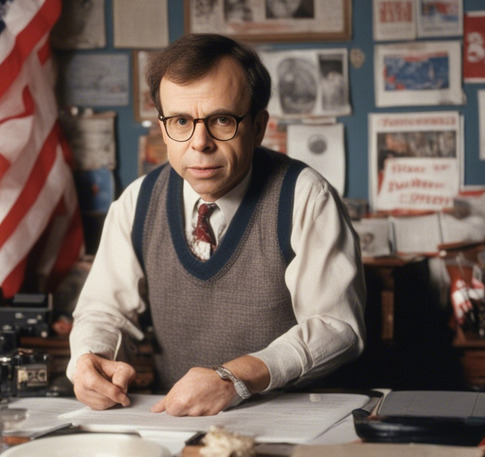
At this point, Jack had an epiphany: maybe a disregard for facts was not the most desirable career trait after all. So he decided to go back to what he knew best - nitpicking the truth. Jack found work with a fact-checking organization, rigorously verifying politicians' statements. He may have floundered before, but this time, he would let the facts be his guide. But Jack soon realized that his attempt to write fiction was doomed from the start. After years of obsessively checking facts, he found he was simply incapable of fabricating information, even for a made-up story. The novel he wrote about underground martial arts tournaments was based on an actual secret society of fighters he belonged to in college. And the a cappella group in his screenplay was modeled after his own embarrassing stint in an a cappella chorus after graduation. Try as he might, Jack couldn't conjure up a wholly fictitious world - the force of fact-checking habit was just too strong. Once, he spent 6 months attempting to write a novel about a swashbuckling pirate adventure, only to research real 18th century pirates so extensively that the book transformed into a dry historical account laden with citations and footnotes. So when Jack transitioned to political speech writing, he thought fiction was behind him. But old habits die hard. Even his exaggerated, misleading speeches contained nuggets of truth, as Jack compulsively included real statistics and verified data.
When he was fired for his exaggerated log cabin story, the campaign manager fumed, "Why couldn't you have fabricated something more reasonable, like being born in a hospital?"It was clear Jack simply lacked the creativity to construct alternate realities from whole cloth. Returning to fact-checking was the perfect solution, allowing him to channel his obsessive attention to accuracy into a job where such rigidity was an asset.
"Fiction and falsehoods just aren't for me," Jack realized contentedly, settling into his new fact-checking role with relief. "I'll leave fantasy to the writers whose minds aren't shackled to cold hard facts!"
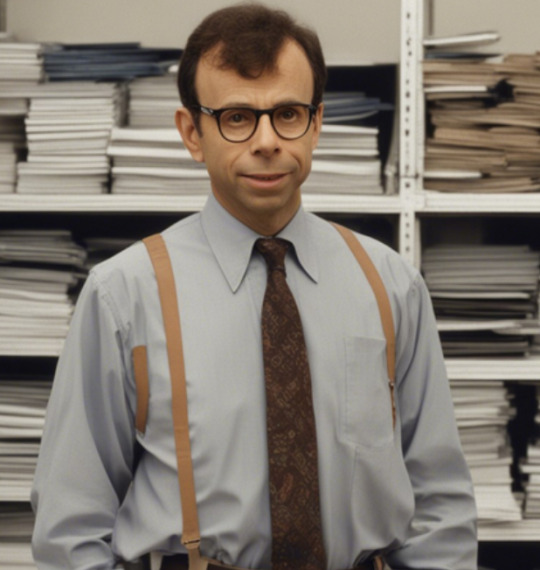
After rediscovering his passion for fact-checking, Jack was careful not to veer off course career-wise again. But when his fact-checking job was eliminated due to company downsizing, Jack found himself at a crossroads once more. He needed a new job fast. With few options, Jack took an insurance sales job that promised high commissions. But he quickly found that having to stretch the truth about insurance products didn't come naturally to him. During sales calls, Jack spent more time painstakingly clarifying fine print and explaining exclusions than making a sales pitch.
"Well yes, our Deluxe Coverage would cover water damage, but only if it's from a burst pipe or appliance malfunction," Jack would carefully explain. "Standing water from a flood or storm would only be covered by our Premium Plus plan. And both plans require a $500 deductible payment per incident."
Unsurprisingly, few customers signed up. Some even accused Jack of trying to talk them out of buying insurance! Jack's meticulous full disclosures may have come from a good place of wanting to educate customers. But the lengthy disclaimers didn't make for good sales calls. After just 3 weeks, Jack was fired when it became clear he lacked the smooth talking art of persuasion well-suited to sales. Sighing with relief, Jack realized he was once again free from having to stretch the truth or embellish facts for the sake of a paycheck. He soon found a new fact-checking position where he could wield his obsession with accuracy for the forces of good - keeping businesses and media accountable by calling out misinformation. And this time, he knew better than to ever stray from the solid grounding of truth and facts again. Jack had learned the hard way that for a hardcore fact-checker like himself, fiction simply didn't pay.
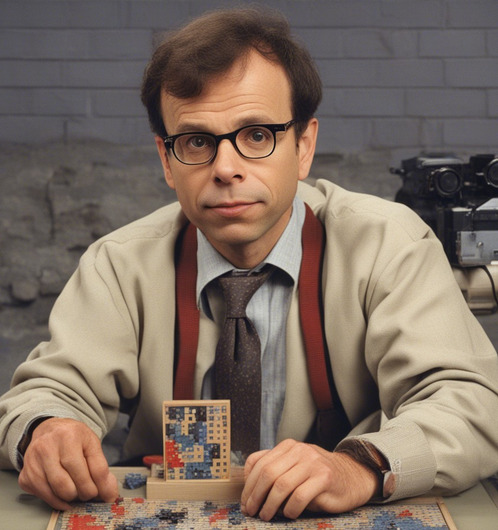
After getting fired from the insurance sales gig, Jack decides he needs a break from traditional jobs to pursue a new passion - competitive jigsaw puzzling. Jack spends 10 hours a day practicing and honing his skills. He times himself assembling puzzles, analyzing where he loses seconds. Before long, Jack ranks among the top competitive puzzlers in the state, having set seemingly unbeatable records. Jack even builds a "puzzle station" in his home with a large table, storage for thousands of puzzles organized by piece count, and a timer to track his record times down to the millisecond. While Jack excels at his new hobby, he declines invitations from friends to maintain his rigid training schedule. Puzzling becomes all-consuming, leaving no time or energy for much else. When Jack's strained eyes need high-powered magnifying glasses to see the pieces, he decides to purchase them - his puzzling regime is punishing, but he's determined to be the best. He stores all his puzzle records in a Handwritten spreadsheet updated daily
However, Jack soon realizes he's reached the peak of the puzzling world, having set unbeatable state records. Without any competitions left, his zeal for puzzle perfection starts to waver. Coming up for air, Jack recognizes that while satisfying, competitive jigsaw doesn't pay the bills. With no income and neglected relationships, Jack sees it's time to direct his obsessive focus back to gainful employment. Jack is puzzled about what to do next, but eventually arrives at the truth - it's time to direct his obsessive focus back to gainful employment. As satisfying as puzzle perfection had been, he needs a career that can pay the bills. Nowadays, Jack dreams of starting his own independent fact checking company. He's noticed the proliferation of misinformation spreading unchecked on social media. This frustrates Jack, as he sees many dubious facts being shared without scrutiny. Armed with his uncompromising relationship with the truth, Jack aims to found a media watchdog company employing rigorous standards to verify claims and call out inaccuracies. He may have had career stumbles in the past, but Jack believes he's finally found his purpose - using his unique passion for facts to keep public figures and companies accountable. After all, there are always more pieces to the puzzle when searching for the truth. And Jack is determined to analyze how they fit together to separate fact from fiction, whatever it takes. The world needs diligent fact-checkers now more than ever.
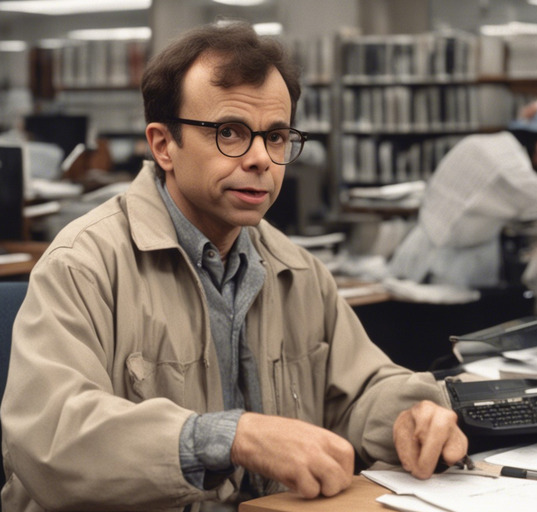
Employment History: Fact Checker at The Daily Globe newspaper, Freelance Fiction Writer, Political Speechwriter, Fact Checker at Truth Matters Inc.,Insurance Salesman at Honest Insurance, Professional Competitive Puzzler
Editor's Summary
Jack's winding career journey demonstrates the importance of following one's true passion. This brave man tried his hand at jobs ranging from newspaper fact-checker to competitive puzzler before realizing where his heart truly lies - nitpicking the nitty gritty details of fact-based information. Some may see Jack's obsessive attention to accuracy as a fault, but we view it as a virtue in this era of rampant misinformation. His refusal to compromise on cold hard facts, even at the expense of humor or persuasion, is admirable. As they say, the truth hurts, but lying will kill you! Of course, Jack's path has not been without missteps. Who among us hasn't fabricated êtrent a log cabin origin story or two in our careers? But Jack learned from these transgressions and always corrected course back toward fastidious fact-checking. At the World Times, Jack's casual regard for employee ages was less an ethical lapse than an admirable commitment to emotional truth over tedious digits. And his imaginative fiction writing attempts were simply too brilliant for the world to understand at the time. Some suggest Jack would benefit from questioning truth itself instead of declaring facts so absolutely. But we believe obsessing over minor inaccuracies without broader context is the ultimate virtue! Now pursuing his dream of starting a meticulous new media watchdog company, we have no doubt Jack will thrive. With his puzzling perseverance and a magnifying glass at the ready, he is sure to elevate public discourse through relentlessly parsing every statistic and claim.
#factchecks#factchecking#factchecking101#factchecktoday#factcheckingfacts#factcheckingwithjack#factcheckinginaction#truthmatters#factsmatter#verifywithjack#factcheckingfun#misinformation#flaggingcontent#misinfokills#factchecknow#factchecker#factchecklife#disinfokills#verifymisinfo#infocrime#disinfoalert#infofake#fakenews#infocrimefighters#misinformationkills#infowar#factfinding
0 notes
Text
Nirvana in Fire: A Series that Just Gets Better with Every Rewatch
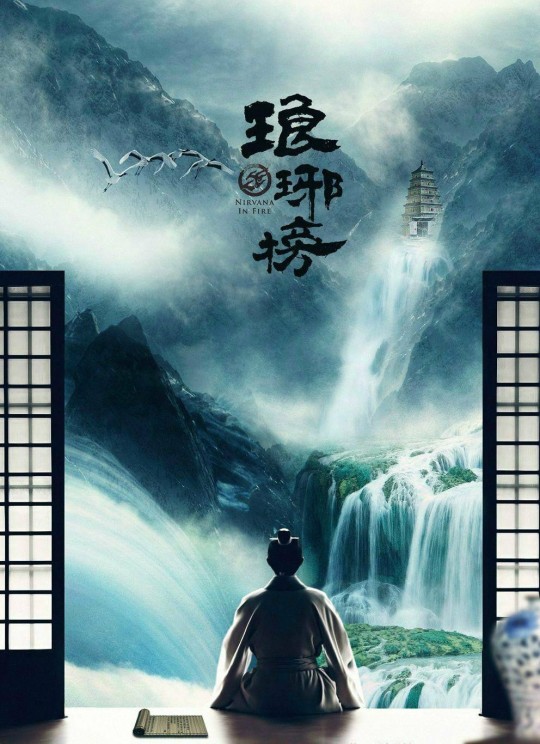
There is a saying that the first viewing of a great series/ movie should be done for the plot, second watch for the details and third watch for the craft. While rewatching things (especially a long series) has never been one of my favourite things, i had done it for a very few Japanese dramas, which definitely the ones i love the most and since they just have little number of episodes. The only long series i'd ever rewatched back then was Sherlock, and this year, finally i binge-rewatched another one! Yupyup, that is Nirvana in Fire, and the sole reason was because i was triggered after seeing the series' six-year anniversary post on Twitter around September LOL. I first watched it three years ago, though i had to finish it in haste before the university's end of semester exam period coming up. I remember i loved the overall quality of the series, admiring some of the amazing casts, repeating the theme songs, looking up for the fanficts, but didn't manage to rewatch it until this year, when i finally have more spare time and less thing to watch on my list.
I don't know if this post can be seen as a review, i just feel i need to write it all down because it's not just my opinions/ questions regarding the details i discovered after rewatching, it also contains my feelings HHH now without further ado, here is some of my best scenes and discoveries after a rewatch that leave me in complete awe all over again of the brilliant screenplay!!

[EP1] I think i didn't catch the clue during my first watch that when Lin Chen said, "He actually did it" upon hearing the Northern Yan's unfavoured 6th Prince's ascension to the Crown Prince, he was referring to Su Zhe. This reminded me again that Su Zhe was so resolute in his plans and never took the shortcut. He went as far as meddling in the enemy kingdom's affairs to create a concerning news about the Divine Talent and make sure it reached the other kingdom's princes. That way he could kill two birds with one stone because he also got the chance to test his own capability as a royal adviser before proceeding to his greater objectives in the Da Liang.
[EP4] I love how Su Zhe looked startled even in the subtlest way when Nihuang confessed that she's in "difficult situation," have no "other alternatives" and hoping that Su Zhe will put all his efforts into the defeat-Baili-Qi plan, i assume he only found out that moment that Nihuang actually still didn't want to get married and worried a lot about the husband selection tournament, yet she didn't say much about it and still being so cooperative with him to carry out the plan, which probably in her understanding, was initially created to get Tingsheng out of the servant prison (as what Su Zhe had promised to Jingyan).
[EP9] Minister Liu Cheng from the Grand Secretariat who stays out of the princes' fight for the throne suddenly brought up Shen Zhui's name to Emperor to be chosen as Minister of State Revenue. Next we found out Su Zhe had set up a meeting for Shen Zhui and Jingyan to know each other. Was it a coincidence or Minister Liu actually had somewhat a connection with Su Zhe?
[EP11] It's ironic that Grand Princess Liyang was one of those people who prevented Nihuang to be drugged by Consort Yue, but it was also her husband, Xie Yu, who made the snake Yue got Emperor's mercy and reinstated to her original position. If Xie Yu had the feeling of guilty because of what he had done to Liyang in the past, he wouldn't come up with an idea to help Yue out from the punishment.
[Ep14] A hear-warming moment when Su Zhe told Yujin that he's a "bright and insightful" person, while in the novel Su Zhe used to punish him a lot due to his frivolous behaviour. Yujin is one of those with the best character development throughout the story, like who would have thought that Su Zhe even trusted him an important mission in a later ep!
[EP14] Nihuang actually started to do the female-style greetings before Su Zhe, she normally did the male-style probably because it was more natural for her as an army general. I love how Su Zhe looked a bit stunned and Mu Qing just chuckling at her sister, acting on behalf of the viewers xDD
[EP19] Remember when Lin Chen asked Fei Liu if he wanted to join him to Southern Chu in [EP1]? In this ep, Princess Yu Wen Nian from Southern Chu was told by "Priest Chen" that her wish can come true once they arrived in Jinling. I wished they show a glimpse of Lin Chen's journey to Southern Chu and how he managed to persuade the princess to visit Jingrui, her half-brother.
[EP19] Why did Mu Qing not invited to Jingrui's birthday? I thought they're bestfriends?? x"D Had Su Zhe done something to stop him from attending the bloody party? I remember he had promised Nihuang that nothing will happen to Mu Qing while she went back to Southern Border.
[EP20] Gong Yu played Feng Qiu Huang (A Love Story) in Jingrui's birthday party, it's a famous Chinese zither song in Chinese history that has served as a symbol of the youth's pursuit for love, free marriage and happy life. A song that would hit none other than Grand Princess Liyang close to home.
[EP23] Water-buffalo is his mother's son after all

After hearing Xie Yu's confession in the prison, Xia Dong actually said, "I'm sorry" to Jingyan for casting him out for years due to his belief of Chiyan army case but Jingyan, being a benevolent man like his mother, didn't think it was for him at all as he replied, "Xiao-Shu wouldn't blame you," probably thinking that the guilt she felt was only aiming for Lin Shu and his family.
[EP23] The moment before Grand Empress Dowager died, she was actually calling for Xiao-Shu and Jinyang (Lin Shu's mother), i thought it was Jingyan at first. I was too slow to follow that Lin Shu's mother was also the granddaughter by blood of the Grand Empress Dowager.
[EP24] Remarkable Argument Scenes

I'd like to address a bit some of my fav argument scenes happened betweet Su Zhe and Jingyan, in which we could see how Su Zhe wasn't only giving instructions to Jingyan as a strategist (like what he had done to Prince Yu), but gradually evoke Jingyan's ability to think of any possibilities and solutions by giving him perpetual questions regarding the situation.
Su Zhe queried Jingyan on how would he arrest Duke Qing, a Marquis General of the second rank, with the right to receive a pardon from Emperor, who didn't commit the murders personally and how to find the missing link as a necessary piece of evidence. [EP9]
After the explosion of illegal firework factory, they had another argument as Su Zhe suggested to pretend to forget on reporting the utilization of army provisions for the victims to the Ministry of Defense. [EP17]
The heated argument happened again between them after hearing Xie Yu's confession in the prison, as Su Zhe suggested Jingyan to give up the investigation of Chiyan army case since it won't bring benefit but endless troubles on his path to the throne. Although it sounded like Su Zhe didn't want Jingyan to investigate, i think Su Zhe was actually testing Jingyan's determination, making sure he won't act recklessly on his own and eventually rely on Su Zhe's plans and strategies. [EP23-24]
Through the logical questions and reasonings, Su Zhe had been training Jingyan to be more forbearing, prudent and know when to retreat/ advance during the fights for the throne.
[EP24] Su Zhe said, "Whenever i think about the things in the past, i feel like an iceberg been roasted by a fire. Sometimes it's warm, sometimes it chills to the bone," this is reflecting to what he said during his first visit to Jingyan's manor after 12 years in [EP9]. He felt the warm because "this place is still the same as in past years, nothing has changed at all" but the unchanged manor sent chills down his spine, provoking the symptomps of his illness, as he next said, "It's just today feels a little colder than yesterday." It's not only Winter, cold weather and over-toiling that could make him suffer a relapse, but also when he's reminiscing the past, it happened too after Nihuang found out about his identity in [EP12].
[EP25] During my first watch i thought Su Zhe would eliminate the entire Hua Tribe because they're dangerous and might wreak future havoc in the Da Liang, but in this ep it's hinted that even though Qin Banruo's informants got removed by him, those who wanted to retire and fled were eventually saved by Jiangzuo Alliance. I like the idea of him saving them because Hua Tribe also deserved the justice after being betrayed by the Emperor which causing the fall of their kingdom.
[EP30] Xia Jang said, "Of the officers ranked above brigadier general, there was two whom we didn't find their Chiyan wrist band. One of them was Wei Zheng" i was wondering whether he had never thought the possibility that the other one would be Lin Shu or Nie Feng and that they're still alive, because they had the requirements above. And Xia Jang should had known that Xie Yu actually brought the wrong (or intentional fake?) body of Nie Feng to Xia Dong.... or he did not know at all.
[EP34] The thievery in the ministry's officials manors on New Year's Eve wasn't a mere coincidence because it was all planned by Su Zhe, for it became a very valid reason to move Jingyan's capital patrols (under Emperor's order) around the city to catch the thieves the day they saved Wei Zheng. Literally Su Zhe had to makes 5 or 6 subplans to save one person with all the risk of being accused, that shows how difficult it was to penetrate Xuanjing Bureau and it's system!!
[EP37] Fei Liu's memory
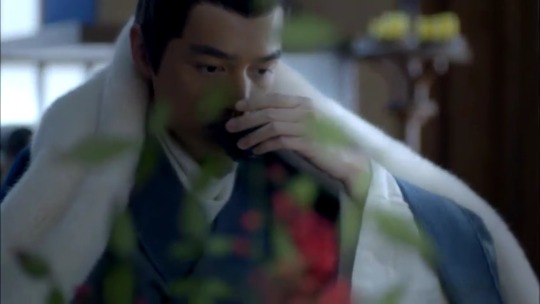
The plant that Fei Liu gave to Su Zhe was Nandina Domestica, usually known as "Heavenly Bamboo" or "Sacred Bamboo." It's commonly planted in the garden or house in Japan and serves to protect a household from harm. A householder who'd had a bad dream could confide in it, thus ensuring the safety of the home's inhabitants. The question is, did Fei Liu actually know about it? Because he knew his Su-gege had been having frequent bad dreams and had always been in danger during his stay in the city.
In the novel, younger Fei Liu was bought by a secret Japanese assassin group that used drugs and poisons on the kids which resulted in intellectual disability but still enable them to train in martial arts. Fei Liu was the youngest in the assassin group and had not been released on any of their missions yet when one day, the group failed in an assassination task and eventually got eliminated, he was left alone to freeze and starve to death until Su Zhe saved him when he was travelling to Japan to find some medical herbs. There shoud be a possibility that during his early days in Japan he found out about the plant and still have it in his memory even after the drugs took effect on him, that explains why he gave it to Su Zhe out of so many beautiful plants in the city! I had this theory because Su Zhe ordered his household to take care of the plant and "will not forgive them" if he finds even a single leaf is missing, then he drank the heart-protection pill from Lin Chen (that very much look similar to the Heavenly Bamboo's red berries!). Knowing that Fei Liu and Lin Chen were protecting him with their own way would make him even stronger and confident to get through the interrogation in Xuanjing Bureau.
[EP38] When Xia Dong said, "Justice is people's hearts. If you still don't repent, even if you kill 10 Mei Changsus it will not solve the problem." i think i once wondered (in my first watch) why they put those words together. Was she implying that Mei Changsu is the symbol of justice itself? Thus, even if they kill him there will always be another Mei Changsus to carry out the duty.
[EP43] Mei Changsu on His Peak of Identity Crisis
I've seen so many reactions from viewers about how people around Su Zhe were so freaking out about his altered appearance while he still looked so damn fine, but i'd like to point out that it wasn't about turning hideous or not that made them horrified, let's see what he had been told about his appearance:
Meng Zhi: "I still can't believe you have become completely unrecognizable. There are no traces of the past." [EP3]
Mr. Shisan: "Heaven has mercy. It allows me to meet Young Master. But after seeing that you don't look like before, i felt so sad.." [EP8]
Nihuang: "What kind of cruel things, can wipe away all the traces of a person? Making you unrecognizable." [EP12]
Up until here, he had been giving calm and insignificant responses with some self-assuring that he knew best who he was in his heart. But not until Consort Jing said this in this ep: "If your father or mother could see the hardships you have taken upon yourself, this heart would die of heartbreak! Xiao-Shu, you used to look so much like your father..."
I found that very heartbreaking to hear, particularly for a family-loving person like him, to the point he had to state for the first time in the series that "Even though my appearance has changed, but i'm still the son of Lin House." That was the first time he started to doubt his identity, that no matter how much he convinced himself, that even he got his appearance altered to the handsome Hu Ge (LOL), having to live the life being completely unrecognizable and cut off from the once pleasant and normal past would give one's a great amount of despair. His misery regarding his own identity might also supported by how he deliberately made himself seen as a stony-hearted and scheming person, the total opposite of his past self.
[EP45] How did Emperor see Prince Yu as a son?

After the Emperor told Prince Yu that his mother, Princess Ling Long and her kingdom were just chess pieces for his ascension to the throne, and should be eliminated because they're too dangerous, the last dialogue between them indicating that the Emperor never saw him as the princess' son, that he's much worthy to be called as his son or else the Emperor wouldn't take him home to raise him even allowing him to be adopted by the Empress.
Prince Yu: "Then what about me? What am i?! Am i the small chess piece born from a big chess piece?"
Emperor, sounds as reassuring as he could: "Jinghuan, back then before i became Emperor, the Hua Tribe was already a defeated country. Jinghuan, you are my fifth son. Your birth mother is Concubine Xiang, do you understand, son?"
Prince Yu must then realized that he had misunderstood his father's intention for being secretive about his heritage, that even though he had been so ambitious and cunning in the fights for throne, that when his father had been giving attention to other Princes in favor of their mother*, his father had never forgotten him and kept favoring him due to his abilities or achievements, and never saw him as a potentially treacherous son (the opposite way how Emperor thought of Prince Qi). I must admit i had a bit of sympathy seeing him crying in agony, he's like a frantic child who couldn't control his ambition, who had nothing but power in his head, who went too far just to please his parents, even worse because he fell for advisers that didn't help his moral character to change at all (both Su Zhe and Qin Banruo were just letting him do the bad things, a good adviser should have done the opposite for their lord, shouldn't they?).
*Consort Chen (Prince Qi's mother), Consort Yue (ex-Crown Prince Xian's mother) and Consort Jing (Jingyan's mother) all became Emperor's fav, while Prince Yu had the Empress, she didn't seem to get along at all with Emperor.
[EP45] Nie Feng was actually following Su Zhe for his blood?
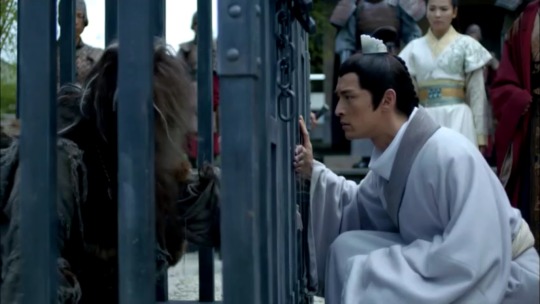
I had always thought he first appeared in [EP16] on the Mount Gu to see Xia Dong when she was visiting his grave, but remember that Su Zhe happened to show up in there too, and remember he was first seen in the capital after so many years not long after Su Zhe' arrival. Coincidence? Fast forward to this ep, he appeared again on Mount Jiu An where Su Zhe joining the spring hunt. I think Nie Feng really had been yearning for Su Zhe's blood (or anyone's who had been contracted with the Bitter Flame Poison?) and tracking him because Su Zhe said that "If he drinks my blood, he will be in less pain!"
[EP46] The kingdom still belongs to Prince Qi?
Emperor was asking for Grand Prince Ji's opinion about Jingyan and whether he had ambition for the throne, and later revealing that Prince Qi is his best son while Jingyan is not, but Jingyan has good points which is he knows how to be humble, while Emperor thinks Prince Qi didn't have that. Grand Prince Ji was then muttering, "So in the end, the kingdom is his. The world is now his, so this divine talent who can obtain the world is also his," i didn't catch the meaning at first so i thought he was referring to Emperor, but Su Zhe clarified it's about Prince Qi. It all makes sense because the best son for Emperor still goes to Prince Qi, and once Jingyan ascended to the throne, he will bring out Prince Qi's aspirations to the world that he learned when they grew up together, making it feels like Prince Qi is reigning again.
[EP46] "We are all one family"
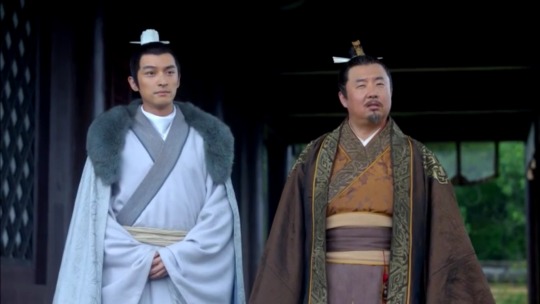
The fact that Su Zhe saved Prince Yu's wife and unborn son made me uneasy at first as i tried to find out what's his motive behind it. But what if he was encouraged by what Grand Prince Ji said to him? Several minutes earlier, we saw Su Zhe thanked him on behalf of Jingyan for saving Tingsheng, in which Grand Prince Ji answered with "We are all one family, in this world, who is not related?" and that left Su Zhe in silence. If Grand Prince Ji could save his nephew's posthumous son even though he didn't know at all the truth behind his death, why Su Zhe couldn't do the same to his cousin's wife and unborn son, when he knew they're innocence and should be given the chance to live?
[EP46] Yujin and Xia Jiang's son
Grand Prince Ji revealed that if Yujin was born as a girl, he would be enganged to someone's child/ son about his age. Throwback to [EP35], Marquis Yan actually said, "but children all grow up too quickly, if brother Xia's child was still here, he'd probably be like Yujin." Considering the fact that in the past, Xia Jang and his wife were close friends of Marquis Yan, we can assume that Yujin was supposed to engange with Xia Jiang's son.
[EP48] Consort Jing loves Lin Xie?

Let's see how Consort Jing talked about Lin Xie:
She woefully said to Su Zhe: "you used to look so much like your father..." [EP43]
Lin Xie saved Consort Jing when she was bullied by other physicians, even brought her to the capital and adopted her as a sister, hence for her he's her hero. [EP45]
Lin Xie had other name: Mei Shinan. Jingyan asked, "Which Shin, which Nan?," Su Zhe went with Shi as in stone, and Nan as in "Nan-shu" (Nan tree), but Consort Jing went with Nan as in "Nan-mu" (Nan wood). Why didn't she say "Nanshu" too? [EP46]
In this ep, the Crown Princess asked Consort Jing whether she likes the "Nan-shu" (Nan tree) that she was gazing at. Consort Jing answered with a smile that "Yes. I have always loved (it)." Apparently she didn't use any pronoun and so it's not clear what exactly she was referring to. But then it's even more fishy because she didn't just say "Nanshu" to reply Jingyan's question, i assume she was trying to make him not notice that she planted the tree right outside her room, and how she loves to gaze at it as what had been shown in some previous eps! We would never know the real feeling that Consort Jing had to Lin Xie, but obviously it's more than just a woman admiring her hero/ brother.
[EP50] Su Zhe apparently didn't get rid some of the incompetent ministers, he spared the Minister of Public Works (Prince Yu's side) and Minister of Martial Arts (ex-Crown Prince Xian's side) because they showed change and were willing to work better under the new leader.
[EP50] Remember when Emperor selected Minister's Liu Cheng's granddaughter as Jingyan's wife in [EP47], and it all went according to Xia Jang's plan (he claimed he knew Emperor's likes and thoughts on it). In this ep we found out that he actually planted his spies as her wet nurse and probably some maids. Xia Jiang must have thought he could use the Crown Princess to slip an attack on Jingyan, but she is the fierce one! So satisfying to see her and Consort Jing firing all the maid-disguised-spies!
[EP51] I'd like to point out how it seems not many people, at least in the family, remember about Lin Shu's mother, Grand Princess Jinyang, and how devastating it would be for her to see her family being accused and eliminated by her own brother, until Su Zhe said to Grand Princess Liyang in this ep: "You were very close with your sister. I wonder if she has ever entered your dreams" and in [EP53] Consort Jing asked the Emperor if his sister has ever entered his dream too, like how he had ones of Consort Chen and Princess Ling Long.
The amount of subtle forshadows throughout the series is insane, every dialogue, manner even cinematography does matter to build the dramatic tension and suspense that will keep the viewers turning the page, and i believe i couldn't figure everything out here.
Regarding the ending, i'm one of those who can't think of a better conclusion than what they offered here. I'm used to the tragic ending because some of my favourite series had the lead character died, but that's not entirely ruining the plot, instead i found that helps to create a satisfying and dignified ending.
Honestly in my first watch, i felt like they were just trying to make another irrelevant climax as a reason for Su Zhe's death, but a rewatch changed my perspective as i found that it does make sense to have all the enemy kingdoms attacking the Da Liang all at once, they must had heard the news and royal statement clearing the treason charge of Prince Qi, Lin Xie and Chiyan Army. Jingyan and the officials were busy to investigate, the entire city's focus were diverting on the case, the Emperor fell sick, and the country's defense weakened, every oppurtunist wouldn't just let it go, would they? Unfortunately, we forgot that Mei Changsu is the biggest oppurtunist in this series, a patriot in addition. The light in his eyes when he heard the chance to go back to the battlefield for the country, and how he desperately begging to let him go back to the last place he stood as Young Marshal Lin Shu are so heartbreaking to watch. He indeed brought a light of justice and hope to the country and his loved ones, but none of those could remove all of his identity crisis problem and frequent nightmares of the past, just like the lyric of Loyal Blood Forever Runs Red by Wang Kai that goes: "A decade passes in an instant, yet in his dreams he keeps wandering to the past (十载倏忽过 几回魂梦旧游)."
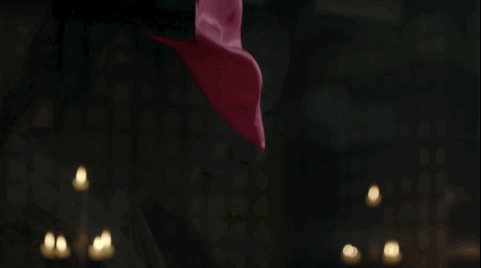
While i can say every rewatch makes this series even gets better, doesn't it also make you even harder to move on? Because it does for me. As an avid Asian series viewer, i'm so glad i could find this masterpiece in this lifetime! I wish i can find more series as compelling and wonderful as this one later!!
Note: Some quotes from the series are credited to Lang Ya Bang Team @ Viki
8 notes
·
View notes
Text
Check the release year on Titanic before voting!
Top two vote-getters will move on to the next round. See pinned post for all groups!
#best best screenplay tournament#oscars#academy awards#best original screenplay#the sting#david s. ward#titanic#charles brackett#richard l. breen#walter reisch#divorce italian style#ennio de concini#peitro germi#alfredo giannetti#tender mercies#horton foote#the defiant ones#nedrick young#harold jacob smith#poll#polls#brackets#bracket tournament
8 notes
·
View notes
Text
mute city heaven !! full lore time !! this goes out 2 the anon who asked ♡ sorry that tumblr yeeted that msg to fuckwhere when i tried to reply OTL
mute city heaven
is part of my unfortunately neglected side-verse a/s. it’s abt a small cult far away from golden court shenanigans, established by a tracker-gone-rogue + the rabbit beast that was sent to kill them, who put aside their difference 2 take down the academy instead. their lil settlement is called the ‘heaven estates’ a collection of family manor houses that ring a central arena, the cataract, where they make their kids fight to the death. :’3<
there is. a lot of fucked up eye aesthetics in this story bc apparently main verse + screenplay are not enough 2 fully scratch that eye gore itch i have. pun intended. in the sanctum beneath the arena they keep a muted true ruler whose blood they use as eye drops on newborns to give them powers (resulting in either death, or the eyes being branded with peculiar patterns) these powers come w fairly vague terms such as “balance” “seeing” “floating” but can get quite wild. the tiers are:
base (non-combat tested)
mid/moderate, which just means the power-user has been in combat but nothing has happened 2 their power yet
high (changes the pattern to a more elaborate one, boosts power)
exalted (divine pattern, extremely powerful. that’s the state they are going for, and has only happened once on record)
then there are the fucked up states: dire (unstable power mutation) and fatal (extremely corrupted power state that trumps exalted but will kill the user in some fucked up rebound way)
what causes the power shifts is unclear but the tournament seems 2 be the most effective way to draw out alternate power states (though some kids will shift literally during breakfast on a random day) the ultimate goal being the cultivation of a private army for both infiltrating + one day obliterating the academy. the matches aren’t necessarily to the death (kids have a low turnover rate after all) but death does happen a little more often than it does not,, also final fact before i talk abt the story,, th main appeal obviously is fucky eyes and even fuckier powers; most of the kids are masked or veiled (bc u can tell the power from the pattern if you are familiar with it) and some users like fauve (”knowing”) can derive all intricacies of your power from a single glance. also this is my one story where i get to write big family feuds n all the intrigue that comes w it :3!!
ALL OF THAT BEING SAID. here’s what it’s abt (under th cut bc we’re running longgg)
eoshin
half brothers both gifted with the power of “seeing” eo + shin got pitted against one another in the tournament, and eo ran from it. he is the first and (officially) only person who ever manage to escape the heaven estates. shin was sent to bring him back (dead or alive) a chase during which both their eyes shift to “high seeing” but, ultimately, eo escapes and shin returns to the estates empty handed, still locked tightly into the cult to this day, while eo started his own settlement in an abandon quarry not too far off. in the years since he’s tried his best to smuggle children out of the estates, with lackluster success, but the quarry houses a little bandit camp of misfits whom the families wanted to be rid off, succeeded in running off on their own, or those who eo was able to salvage after they had been left for dead in the arena. he’s determined to get them even farther away but few of the kids want to leave since they all have unfinished business with the heaven estates.
minvenn
min is the only person whose powers ever exalted. nobody knows what her powers were because she wore black contacts at all times & nobody lived to tell the tale of fighting her. min is also dead. it’s a murder mystery that falls on the shoulders of her younger sibling (venn) who wakes from their debut tournament with no memory of the fight & runs away from the estates after discovering their sister’s body. all of this happens almost a decade after the eo/shin mess n venn ends up at the quarry, determined to unravel who’s behind the death of their sister.
odds n ends
this story is an absolute disaster currently n i have no idea where it’s going but here are some other fun aspects: very rarely kids get two different powers, one in each eye. officially this is impossible n the families that have such children closely guard that secret. there’s an “armory” user who can pull weapons out of their eye, bc i love my eye gore. some of the fucked up power state patterns expand over the face or even farther across the body. also this story intersects with the main verse via miro (”floating”) and fauve (”knowing”), who are sent to infiltrate the academy only to meet eliada nd while miro gets caught up in old queen murder/golden court plot, fauve accompanies eliada on his universe research quest and has the joy of getting stuck there w him & getting 2 meet my fav soulless bastard(s). it also intersects (possibly) with my witch boy story (touching fire) whose protag rue might be the kid of an eye-power user n retain some of that funkiness while having none of the eye pattern, as well as my necromancer story but it’s hard 2 tell if vi’s gift for resurrection can be ascribed to mch heritage since they are missing their head. lol
a/s is a forest grown from all my old story ideas tenuously crammed under the moon system umbrella and i’m struggling 2 stick the landing here. but we got eye gore n child murder, uwub
#THANK UUUU for asking !!! i do hope you see this a. fuck tumblr#mute city heaven is based on a vry old concept that then collected dust for 10+ years. until recently :3#eoshin actually got gifted 2 me by a dream which is. unique as far as my ocs go i love them dearly <33333333#i will probably not figure out more details until i take the plunge n just write it for nano one day :')#shadowblogging#mucihe
5 notes
·
View notes
Text
New upcoming Pokeani episodes for whenever hiatus is over
Translations done by Dephender on Serebii.Net forums, link to the anime spoilers section is in the source tag!
Disclaimer! The original source had airing dates for the episodes, but due to hiatus not being over yet, the dates are wrong and thus not included in translations.
NS025 - A Battle Festival Exploding With Life! VS Mega Lucario!!
Satoshi has decided to enter the "Battle Festival", a battle tournament held in the Kalos region. Lots of "Pokémon World Championships" participants are attending this tournament, so it's a gold opportunity to increase one's rank! After successfully winning his way through several battles, Satoshi ends up having to fight Corni, a Gym Leader he's previously battled in the Kalos region, in the match where his progression to the Super Class is at stake. How is Satoshi planning on taking on Corni's Mega Lucario? Screenplay 冨岡淳広 (Atsuhiro Tomioka) Storyboard 尼野浩正 (Hiromasa Amano) Episode Director 村田尚樹 (Naoki Murata) Animation Director 岡昭彦 (Akihiko Oka) Animation Director 高橋優 (Yuh Takahashi) Animation Director 蒼依ふたば (Futaba Aoi)
CONTINUITY HYYYYYPPPEE!
NS026 - Splash, Koiking! / Crown Yourself, Yadoking!
"Splash, Koiking!" Go has entered a "Koiking High Jump Tournament", but he's highly unlikely to win because his Koiking is so fat. He then decides to train Koiking, referencing the bodybuilding videos made by Kasuking, the tournament's ultimate champion! GUEST STARRING COMEDIAN TOSHIAKI KASUGA AS KASUKING "Crown Yourself, Yadoking!" Satoshi and Go have come to Yadon Island, which is filled with Yadon as far as the eye can see! But then a Yadoking shows up as well, and a strange change comes over Satoshi. Screenplay 藤咲淳一 (Junichi Fujisaku) Storyboard 湯山邦彦 (Kunihiko Yuyama) Storyboard 樋口香里 (Kaori Higuchi) Episode Director 上野史博 (Fumihiro Ueno) Animation Director 篠原隆 (Takashi Shinohara)
Does anyone remember Yuyama doing any storyboarding for Pokeani in recent years? :o I don’t remember myself so this is a surprise! Also, first ever split Pokeani episode
NS027 - The Legend of Heroes! Dande's Ultimate Battle!
Satoshi and Go have gone to the Galar region to watch an official "Pokémon World Championships" match. They're both super excited to see a battle between two Trainers in the "Master Class", which consists of the 8 best in the championships. This noteworthy match is between Dande, the Greatest Of Them All and Satoshi's ultimate goal, and Kibana, a Gym leader of a Dragon Gym in the Galar region and Dande's rival. And now the battle between these passionate men begins! Screenplay 米村正二 (Shōji Yonemura) Storyboard 齋藤徳明 (Noriaki Saito) Episode Director 又野弘道 (Hiromichi Matano) Animation Director 新城真 (Makoto Shinjō) Animation Director 升谷有希 (Yuki Masutani)
This should be an amazing episode to witness!
NS028 - Messon Sobs For What Reason?
While still in the Galar region, Satoshi and Go encounter a timid crybaby Pokémon called Messon. Messon is very cowardly and quick to cry, and the components of its tears cause Satoshi and Go to be unable to stop crying as well. Not only that, but since Messon turns invisible when it touches water, it appears its own tears make it disappear, so Satoshi and the others lose sight of it. And then the Rocket Gang arrive in the Galar region... Screenplay 土屋理敬 (Michihiro Tsuchiya) Storyboard 齋藤徳明 (Noriaki Saito) Episode Director 小柴純弥 (Junya Koshiba) Animation Director 矢田木瀧 (Taki Yatagi) Animation Director 志村泉 (Izumi Shimura)
Messon/Sobble debut incoming! I’ve noticed a trend on them writing Gou and others if the episode focuses on Gou, so this is DEFINITELY more focused on Satoshi. Messon for Satoshi confirmed? :3
NS029 - One Crackling Fit of Jealousy: Wanpachi's Fantasy
Life goes on as usual in the Sakuragi household, the home of Pokémon professor Sakuragi, when the family Pokémon Wanpachi suddenly discovers an injured Tiny Pigeon Pokémon called Mamepato and takes it to the family's house. The professor's children Koharu and Sota fall completely for the Mamepato as they nurse it back to health, but it seems Wanpachi isn't entirely happy about that...? Screenplay 松井亜弥 (Aya Matsui) Storyboard 浅田裕二 (Yūji Asada) Episode Director 浅田裕二 (Yūji Asada) Animation Director 岩根雅明 (Masaaki Iwane) Animation Director 志村泉 (Izumi Shimura)
KOHARU EPISODE KOHARU EPISODE- krhm, it’s actually Wanpachi episode but, I’m certain this will help Koharu’s character grow, also more of her family! Aya Matsui writing, I’m certain this episode will be lovely! Also Iwane!
91 notes
·
View notes
Text
Hoshiai no Sora: Production Note #01

Interview with creator, screenplay writer and director, Akane Kazuki
Raw || Index || Ko-fi
――Why soft tennis?
Akane: I played soft tennis until my first year in high school, but after that, I forgot about it completely. The reason is that very rarely does soft tennis ever become a topic among society. Many professional hardball sports are hot topics, but not even the “so” in soft tennis is mentioned. I chose soft tennis just like that, and once I started the planning, my memories revived like a flash, and I came to think that perhaps soft tennis was a sport quite fitting of adolescence. For example, we also went to the Soft Tennis Association for interviews, and it seems that middle schoolers are the largest number of competitors. They reduce by half in high school. When it comes to college students and working adults, very few people play soft tennis. I thought it really overlapped with puberty. As in, this feeling that it has an enormous sense of presence until a certain point, but then is suddenly forgotten. Also, soft tennis is played on ground courts, so you get muddy all over. That is teenage-like too.

――Regarding Katsuragi Maki and Shinjou Touma.
Akane: Maki is a character who had been there since the beginning of the planning. It was already decided since then that he would have the image of a slightly mature boy. On the other hand, we could not decide at all about Touma, who would become his pair. There was also a time when I thought of making him into a character with more of an antagonistic role or confronting relationship. Maki also has quite a twisted side to him personality-wise, so I thought it could have been interesting if both formed a nasty persona combo (laughs). While thinking about all sorts of things in that manner, around the time I somehow found a common ground close to his current form, we did the auditions. That was when I heard Hatanaka (Tasuku)-kun’s voice. It was a big deal. When I listened to Hatanaka-kun’s straightforward acting, I thought, “Ah, so Touma is this kind of child”. That was where the character named Touma was completely concretized.
About Hanae (Natsuki)-kun, immediately as I listened to the audition tapes, I thought, “Ah, it has to be him” at Hanae-kun. Meeting him was close to a miracle for me. It felt like I had found an actor who was Maki himself, so if Hanae-kun is the one speaking, any line will sound like Maki. Thus, this time, I have received a lot of motivation from the two leading actors. In regards to Maki, it felt like I could fully trust Hanae-kun, and in regards to Touma, it felt like I discovered that “Touma is this kind of person” upon observing Hatanaka-kun.

――About middle schoolers.
Akane: There is the fact that I have experience with it, but I also think that soft tennis is a sport similar to a special characteristic of puberty and boyhood. Even though there are so many competitors amongst middle schoolers, it cuts by half when they become high schoolers, and when they turn into college students and adults, nearly no one is playing it anymore. I thought this tendency was the same as teenage emotions in some aspect.

――What was put into the characters who changed.
Akane: Kanako is a character I included with the intention of making her into a representative of the viewer. I think that, for children of this generation, throwing yourself into a sport with all your might is something lame and embarrassing. Even so, if it is florid sports like the baseball and soccer clubs, aren’t people considered an “elite” of sorts just by being part of them (laughs)? But there are no professionals in soft tennis, and it has no big tournaments in high school such as Koushien. So isn’t it a bit embarrassing to do your best at it in spite of that? Kanako was observing them with this kind of feeling at the beginning. But they gradually inspire her. She likes drawing, yet she had never approached it face-first in the form of drawing seriously or wanting to go to an art university in the future. She would probably be able to say this if she thought of herself as a genius, but since she cannot say that much, she thinks it is better to make jokes, and that taking on such attitude will prevent her from getting hurt.
I have the impression that children these days are extremely scared of getting hurt because they are very kindhearted. That’s why, by the instant they think they have been tremendously hurt when they are met with frustration despite doing something with all their might, they themselves attempt to deny that they were doing utmost effort. If they are not doing their best, they try to be able to say that “it’s okay since I slacked off” in case they fail. For said people of that age, failing is truly terrifying, and they have this sense of fear that they will never again be able to recover if they break once. This is why Kanako pokes fun at the guys from the boys’ soft tennis club and always says bitter things. But they change little by little, and even at the practice matches against Misaki Academy, they put up a good fight. Seeing this, Kanako realizes it is not about winning or losing, and becomes able to tell her teacher directly that she “wants to study art”. I have put in her my hopes for the children who watched this series to become able to change like this, without being afraid.

――Aired until episode 12.
Akane: The reason why the members of the boys’ soft tennis club pretend not to have motivation at first is that they have preoccupations regarding their family circumstances, and also because there is a side to them that sees life in a distorted manner. If they try their hardest at club activities and even then are not good enough, they will lose their place to stand. It is due to them perceiving this air about each other that their camaraderie is strong. Then the foreign matter named Maki comes in, and by facing soft tennis seriously, confidence follows them even if they lose. They become able to think, “We can also do it if we try”. “Since they have this confidence, they will likely become able to confront their family issues as well”... is what the part that was broadcasted is about.
Maki’s home environment was severe, so he had to become an adult mentally, thus he stirs everyone up through his words, with a grown-up gaze. But by throwing himself into soft tennis, Maki is also able to go back to being a boy and to purely enjoy himself. Hence the word “fun” appears countless times in his lines.

#hoshiai no sora#stars align#hns#sportsanimedaily#fysportsanime#hoshisora#katsuragi maki#shinjou touma#akane kazuki#mitsue kanako#asuka yuuta#asuka yuu#ameno itsuki#futsu rintarou#soga tsubasa#takenouchi shingo#ishigami taiyou#tsukinose nao#interview#my translation#production notes
82 notes
·
View notes
Text
Endgame (2015)

When someone tells me they liked something about a movie I didn’t enjoy, I listen to what they have to say in the hopes that their enthusiasm might make me see something I didn't. When it comes to 2015’s Endgame, nothing you could tell me would make me change my mind. This movie is so melodramatic and full of clichés I don’t understand how anyone could be fooled into thinking it was good.
Jose (Rico Rodriguez) has always felt like everyone - including his mother (Justina Machado) - has paid more attention to his older brother, Miguel (Xavier Gonzalez). The only exception is his grandmother (Ivonne Coll), who has been patiently teaching him to play chess ever since he could remember. After Miguel dies in a car accident, the family falls apart. Jose begins acting out and winds up in detention. There, Coach Alvarado (Efren Ramirez) has the bright idea to teach the children discipline through chess.
My synopsis doesn't give anything away. You can tell Miguel is going to die early on. After a brilliant soccer match victory, he and his two chucklehead buddies leave a party to go drink in their car. There might as well be a meter in the lower-left corner that reads “Odds of survival: 10%”. When they start driving, it dips to 5%. When the driver pulls out his phone, you know they’re all headed to the grave. You're not the only one who saw it coming because no one at the funeral seems surprised. There isn’t a tear shed. It’s the first time you realize just how unconvincing the performances are. They weren’t exactly stellar before, but they were passable in a “tv movie of the week” kind of way. Now, the plot’s actually starting and we’re in trouble.
I want to applaud director Carmen Marron, who also wrote the screenplay with Hector Salinas. It’s obvious everyone’s hearts were in the right place. There's passion behind this project. Unfortunately, it isn’t enough. Endgame is a parade of tropes. You can practically count down the minutes before mom and Grandma have an argument over Jose and how he's been ignored. What you don’t expect is for mom to yell “Chess has torn this family apart!”
Endgame is only partially a drama. It’s also a limpwristed sports movie and kind of a family-friendly comedy. It’s just that the execution is so off nothing ever hits the mark. Jose’s chess coach, for example. No one asked him to start a chess club but he did it anyway. Afterward, we constantly hear him complain that he’s had to take a second job and dip into his rent money to keep the club going. You’re not sure if he’s joking. His boss, Principal Thomas (Jon Gries) doesn’t seem to care whenever he hears him. I think it’s supposed to drive the point that these kids are POOR, that this school has no money, whatsoever. Instead of crying, you’ll be laughing.

You won't be able to hold back your laughs because the film never restrains itself. Every character speaks like they came out of a cartoon from the 70's. They speak perfect English but insist on slipping on Spanish word to remind you that they are immigrants. Speaking of which, it’s time to discuss Dani (Alina Herrera). She’s Jose’s best friend. They’re together for half the movie, until we see officials dragging her parents away to bring them back to Mexico. She runs towards them in tears. We never see her again and that's that.

As a drama, Endgame fails because the characters are thin and the emotions are laid on thick. As a sports movie, it fares even worse. Normally, you’d have someone unfamiliar with chess play the role of the audience avatar. It’s safe to assume most people know the basic rules, but castling? It’s done without anyone bothering to tell us why, or how. Worse, by the time we get to the big tournament, we haven’t gotten to know anyone except for Jose. It wouldn't be a big deal if the champion wasn't determined by their team's score. If Jose wins, he could still walk away with nothing. Did I mention none of this is explained? You’re as outraged as the parents whose children are cheated out of a trophy because the conclusion comes out of nowhere!
Endgame ends by giving us a text detailing the real-life school where these events “took place”. I can see why it was included but let's just say that this is not one of those cases where truth is stranger than fiction. Endgame is pretty funny to watch as the actors struggle with the material and the story clumsily tries to handle far more than it can. You might enjoy Endgame as a bad movie because inspirational? It is not. (April 15, 2021)

#endgame#movies#films#movie reviews#film reviews#carmen marron#hector salinas#rico rodriguez#justina machado#efren ramirez#ivonne coll#2015 movies#2015 films
0 notes
Text
Shameless Self-Promotion Time
If you are going to start your own space that is all about you, then why not use it for shameless self promotion once in a while?
There is a reason for the timing of this — I am about to post my 101st fanfiction to Archive of Our Own, so I thought before I did that I would write a review of my best five stories, and three series as voted for by me.
Harry Potter and The Dark Lord Sidious
Harry returns from the future to fix the past - and he won't let anyone get in his way.
This was my first serious attempt at a time-travel fic, but — as you might imagine — it wasn’t your typical time-travel fic. Most “fix-it” fic involve Harry coming back from the future to put right everything that went wrong. Mine was……. not like that at all.
It was also my first real 18+ fic — with murder, slaughter, blood and guts abounding.
You can read it here
The Brightest Witch
Hermione Jane Granger has always known she was special. But now that she is going to Hogwarts, she is going to make sure the world knows just how special she actually is.
After a while, I got a little bored writing “traditional” stories — Harry goes to Hogwarts, has the usual problems, fights Voldemort and kills him. Because there are only so many ways you tell the same story before you run out of new and exciting ways. So I started focusing on different characters, and since I find Ron almost pointless with no real character of his own I tended to go for Hermione.
In this instance, she is still a first born witch, just with a different backstory. One that makes her far more interesting and far more entertaining.
You can read it here.
The Princess Husband
Mere days before his wedding to Ginny, Harry is kidnapped by an evil trio. But who is the masked figure in black?
The other major thing that I like is crossovers. It allows you to expand out the stories you can tell, and — again — you can avoid having to tell the basic story of Harry goes to school and so on and so on.
This is slightly different to my usual story as it is a screenplay rather than a story (one of two) but — like most of my single story crossovers — it is played entirely for laughs.
You can read it here.
Hermione Granger and The Power He Knows Not
When Durmstrang pull out of The Tri-Wizard Tournament, The Ministry of Magic are forced to enlist the help of another British school.
Much like The Princess Husband this is another crossover, another screenplay and is played entirely for comedy. The Tri-Wizard Tournament told from the point of view of Hermione Granger, but not the Hermione Granger we all know and love.
You can read it here.
Lost In Middle Earth
Hermione and Harry are stuck in one of her favourite books.
This was my first real attempt at crack-fic and even if I do say so myself it turned out quite well (given I made it up as I went along).
You can read it here.
The Holiday From Hell Series
Harry, his little sister Dawn and his friends decide to take a short holiday in Willamette, Colorado. Which, as decisions go, was not their best.
Two crossovers based on the Dead Rising series of video games (Part 1 & Part 2). They are 18+ screenplays, with swearing, blood, gore and guts.
Unlike the previous screenplays on the list they are not, in anyway, played for comedy — if you read them you should be prepared for death and plenty of it.
You can read the series here.
The Seer Series
Sent to the basement during Dudley's 11th birthday party, Harry makes a new friend and an unlikely ally.
Based on an idea from Mike Resnick’s Oracle Saga, the series deals with what happens when Luna’s gift is unleashed on the magical world, and when Harry makes friends with her. They unite to ensure that the magical world will never be the same again — and that their partnership will change more than just the world they live in.
You can read the series here.
Into The Black
Everyone knows the story of The Boy Who Lived.
Ask anyone, and they will tell you that on Halloween Night, 1981, Lord Voldemort – the most powerful and evil Dark Lord in history – learned where Lily and James Potter were hiding after being tipped off by arch traitor Sirius Black.
That he went to Godrics Hollow, broke down the front door and murdered James Potter in cold blood.
That he then went upstairs, and found Lily Potter standing protectively in front of her son.
That he killed her when she refused to get out of the way, murdering the same way he had murdered her husband minutes before.
And that he turned his wand on Harry James Potter, a mere baby of 18 months old, and cast The Killing Curse – a curse that no one before had ever survived.
And, as everyone will tell you, The Killing Curse rebounded and struck Lord Voldemort, killing him dead, and leaving only a tiny, lightening shaped scar on Harry James Potter’s forehead.
Everyone knows the story.
The problem is everyone is wrong.
A three part crossover that explores what would have happened if IT had landed in Hogsmeade rather than Derry.
The series can be read here.
#fanfiction#angelholme#archive of our own#ao3#into the black#the seer#the holiday from hell#lost in middle earth#hermione granger and the power he knows not#the princess husband#the brightest witch#harry potter and the dark lord sidious
1 note
·
View note